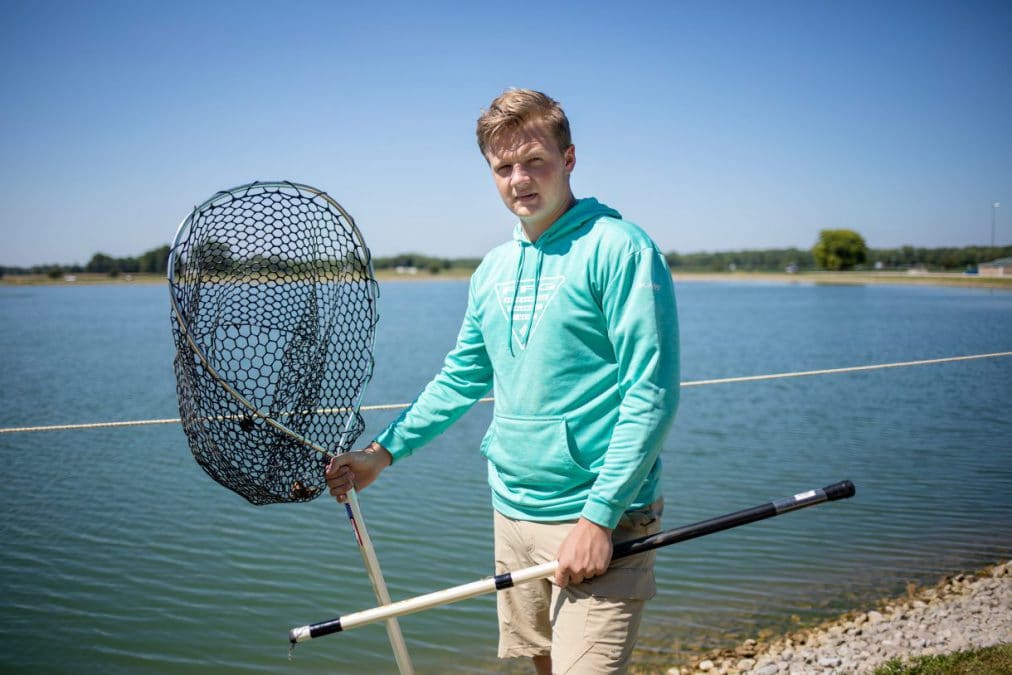The hot Pottawatomie County summer does not hold 17-year-old Tribal member Beau Favre back from enjoying the outdoors. Throughout the long school break, he wanted to find a way to serve the Nation while doing something he loves: fishing.

However, fishing at Tribal ponds requires approval. Favre approached Citizen Potawatomi Nation Vice-Chairman Linda Capps for permission and presented his plans to document the species, size and weight of everything caught before releasing them back into the water.
“Beau is the most pleasant, polite young man that you will ever meet,” Ms. Capps said. Knowing how beneficial his research could be, she put Favre in contact with several Tribal departments, and he began his project late June into early July.
“Mostly I just want to help the Tribe in any way that I can, even if that means monitoring the health of species,” he said.
The project
The geothermal pond west of the FireLake Ball Fields heats and cools Tribal enterprises. A balanced ecology is important to running efficiently, and Favre’s research provides key insight.
“The carp are one of the main reasons why the pond is easier to clean for the cleaning crew as they’re doing maintenance on the fountains because they eat the algae that grows in the area, and it just reduces the overall growth and gunk,” Favre said.
He uses a cane fishing pole with 60 lb. monofilament line and dried meat as bait.
“We hold the jerky near the surface,” Favre said. “It’s kind of in their feeding area because if you had jerky on the bottom, they probably wouldn’t see it because they are all hanging around on the surface and feeding there.”
Cane poles are longer than traditional ones, and instead of using a rod and reel, they typically feature a line that is approximately the same length as the pole itself.
“All fishing at Tribal ponds is cane poles only,” he explained. “These carp can produce up to 80 pounds of force, and putting all of that onto one solid pole — it gets a bit hectic at times.”
Favre enjoys the thrill of hooking one, and he has found many different species that call the geothermal pond home.
“I’ve seen big 2-pound bluegill, which is really rare. On the carp, the biggest I’ve seen so far was a 5-footer, and it looks like it was about 45 pounds,” he said.
After Favre makes a catch, he measures, weighs and tags them to help differentiate the fish and keep accurate records for years to come.
Given his findings so far, the lack of predator species concerns him the most.
“You used to see a lot of bass kind of patrolling the beaches and the shore, but lately I just haven’t seen any or even seen any activity from them,” Favre said.
Additionally, he and his dad Chris Favre are currently developing an online database to store all of the information obtained.
“You could search the carp by its ID tag, and it would give you the size it was the last time you caught it and the sizes before on previous catches, and that’s to see how fast they’re growing overtime,” he said.
As a junior at Tecumseh High School, Favre has to balance developing the website along with school, sports and other commitments. Although he does not have an expected date for the database’s completion, he hopes to complete it within the next few years.
In the meantime, he takes advantage of the chance to enjoy outdoor activities with fellow Tribal members and family while also helping the Nation conduct important ecological research.
CPN reminds Tribal members and the public that fishing CPN ponds and waterways requires prior approval from Tribal administration. Call 405-275-3121 for more information.
